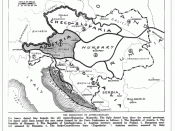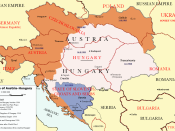World War 1 is often considered as being the fault of one nation, namely Germany. However World War 1 cannot be attributed solely as the fault of Germany as there are many other mitigating circumstances that disprove this. In 1914 Europe was a divided continent with five superpowers dominating it. (These 5 empires being Great Britain, France, Germany, Austria-Hungary and Russia) It was the richest continent in the world, and by far the most powerful, yet it was gearing itself for a war that would ultimately end in the death of 10 million, and the loss of its status as the most powerful continent in the world. Many diplomatic crises, notably in Africa, had weakened relationships to a point where diplomacy was to fail with catastrophic results.
So how did Europe get to this stage that would lead to World War 1? A large reason that Europe was this divided was because of a date of huge significance, a day that happened 43 years prior to the outbreak of war, the day when William I was proclaimed King of a united Germany.
This led to a major shift in power from the traditional superpowers such as France and Austria-Hungary and gave Germany, in the centre of Europe, huge powers and influence and led to much political turbulence and foreign disputes. Each ruler in Europe was obsessed by having the grandest empire. Britain had the largest empire, ruling over 1/3 of the world and forcing 'civilisation' upon the natives of many parts of Africa, India and the Americas. France had been the dominant power under Napoleon, but his ill-fated march on Moscow in 1812 was still hurting France as they struggled to gain more territory, a mission that they failed in the Franco-Prussian war. They were desperate for revenge against...


